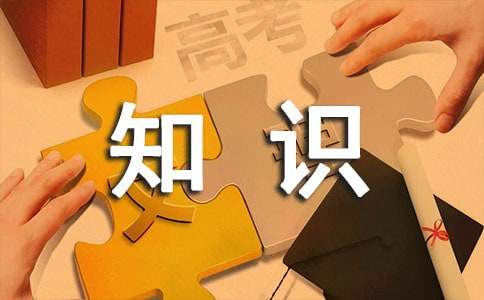- 相關(guān)推薦
小升初英語(yǔ)語(yǔ)法強(qiáng)調(diào)句的復(fù)習(xí)知識(shí)點(diǎn)
1. It _____ Mike and Mary who helped the old man several days ago.

A. was B. are C. were D. had been
2. It was not until 1920 _____ regular radio broadcasts began.
A. which B. when C. that D. since
3. She said she would go and she ________ go.
A. didn’t B. did C. really D. would
4. It was the training _____ he had as a young man _____ made him such a good engineer.
A. what; that B. that; what C. that; which D. which; that
5. — Were all three people in the car injured in the accident?
— No, ______ only the two passengers who got hurt.
A. there were B. it were C. there was D. it was
6. It was not until 1936___baseball became a regular part of Olympic Games.
A. then B. which C. that D. when
7. ___in 1943___the harmful smog made its appearance in Los Angeles.
A. Only… that B. It was… then
C. That it was… when D. It was… that
8. It was on the National Day___ she met with her separated sister.
A. that B. where C. when D. which
9. ___the 1500‘s___the first European explored the coast of California.
A. It was until……then B. It was not until … when
C. It is until……that D. It was not until……that
10. ___in this room that our first meeting was held.
A. Just when B. When C. Where D. It was
11. It was last night ___ I see the comet.
A. the time B. when C. that D. which
12. It was only with the help of the local guide ___________.
A. was the mountain climber rescued
B. that the mountain climber was rescued
C. when the mountain climber was rescued
D. then the mountain climber was rescued
13. The Foreign Minister said, _______ our hope that the two sides will work towards peace.
A. This is B. There is C. That is D. It is
14.Was _____ that I saw last night at the concert?
A. it you B. not you C. you D. that yourself
15.It was _____ he said _____ disappointed me.
A. what, that B. that, that
C. what, what D. that, what
16.It was with great joy he received the news that his lost daughter had been found.
A.because B.which C.since D.that
17. It is ______ any wonder that his friend doesn’t like watching television much.
A. no B. such C. nearly D. hardly
18.It was back home after the experiment.
A.not until midnight did he go
B.until midnight that he didn’t go
C.not until midnight that he went
D.until midnight when he didn’t go
19.Was it in 1969 _____ the American astronaut succeeded _____ landing on the moon?
A. when, on B. that, on C. when, in D. that, in
20. It is these poisonous products _______ can cause the symptoms of the flu, such as headache and aching muscles.
A. who B. that C. how D. what
21.It is the ability to do the job _______matters not where you come from or what you are.
A. one B. that C. what D. it
22. It was not until 1920 _____ regular radio broadcasts began.
A. while B. which C. that D. since
23. _____ is a fact that English is being accepted as an international language.
A. There B. This C. That D. It
24. It was only with the help of the local guide ___________.
A. was the mountain climber rescued
B. that the mountain climber was rescued
C. when the mountain climber was rescued
D. then the mountain climber was rescued
25. Who was it _____ put so many large stones on the road?
A. this B. that C. he D. she
26. What a silly mistake it is _____ you’ve made!
A. it B. this C. that D. which
27. It was the boy _____ had been in prison _____ stole the money.
A. who, where B. that, how
C. who, that D. that, which
28. Why was _____ that the old woman was sent to prison?
A. he B. it C. that D. what
29. It was when she was about to go to bed _____ the telephone rang.
A. since B. as C. that D. then
30. It may have been at Christmas _____ John gave Mary a handbag.
A. before B. who C. that D. when
【答案及解析】
1. A。本題考查的是強(qiáng)調(diào)句式。強(qiáng)調(diào)句式由It is/was + 被強(qiáng)調(diào)成分 +that/who…構(gòu)成。由于句中的動(dòng)作是發(fā)生在過(guò)去,故選A。
2. C。本題考查的是強(qiáng)調(diào)句式。強(qiáng)調(diào)句式由It is/was + 被強(qiáng)調(diào)成分 +that/who…構(gòu)成。當(dāng)被強(qiáng)調(diào)部分指人時(shí),用who,當(dāng)被強(qiáng)調(diào)部分指物時(shí),用that。
3. B。在謂語(yǔ)動(dòng)詞前加do表示對(duì)動(dòng)作的強(qiáng)調(diào)。and連接兩個(gè)并列謂語(yǔ),其形式應(yīng)一致,故用過(guò)去 時(shí)態(tài)。
4. A。此題考查的強(qiáng)調(diào)句型中包含一個(gè)定語(yǔ)從句。What引導(dǎo)的定語(yǔ)從句,修飾被強(qiáng)調(diào)部分the training,that從句構(gòu)成強(qiáng)調(diào)句中的真正主語(yǔ)。
5. D。本題考查的是強(qiáng)調(diào)句式。強(qiáng)調(diào)句式由it is/was + 被強(qiáng)調(diào)成分 +that/who…構(gòu)成。 6. C。本題考查的是強(qiáng)調(diào)句式。強(qiáng)調(diào)句式由it is/was + 被強(qiáng) 調(diào)成分+that/who…構(gòu)成。本句強(qiáng)調(diào)的是時(shí)間。
7. D。本題考查的是強(qiáng)調(diào)句式。強(qiáng)調(diào)句式由it is/was + 被強(qiáng)調(diào)成分 +that/who…構(gòu)成。本句強(qiáng)調(diào)的是時(shí)間。
8. A。本題考查的是強(qiáng)調(diào)句式。強(qiáng)調(diào)句式由it is/was + 被強(qiáng)調(diào)成分 +that/who…構(gòu)成。本句強(qiáng)調(diào)的是時(shí)間。
9. D。本題考查的是強(qiáng)調(diào)句式。強(qiáng)調(diào)句式由it is/was + 被強(qiáng)調(diào)成分 +that/who…構(gòu)成。本句強(qiáng)調(diào)的是時(shí)間。not until…意為直到 ……才。
10. D。本題考查的是強(qiáng)調(diào)句式。強(qiáng)調(diào)句式由it is/was + 被強(qiáng)調(diào)成分 +that/who…構(gòu)成。本句強(qiáng)調(diào)的是地點(diǎn)。
11. C。本題考查的是強(qiáng)調(diào)句式。強(qiáng)調(diào)句式由it is/was + 被強(qiáng)調(diào)成分 +that/who…構(gòu)成。本句強(qiáng)調(diào)的是時(shí)間。
12. B。本題考查的是強(qiáng)調(diào)句式。強(qiáng)調(diào)句式由it is/was + 被強(qiáng)調(diào)成分 +that/who…構(gòu)成。 13. D。本題考查的是強(qiáng)調(diào)句式。強(qiáng)調(diào)句式由it is/was + 被 強(qiáng)調(diào)成分+that/who…構(gòu)成。 14. A。此題考查的是強(qiáng)調(diào)句的一般疑問(wèn)句式。強(qiáng)調(diào)句的一般 疑問(wèn)句式是Is/Was +被強(qiáng)調(diào)部分+that…。
15. A。此題考查的強(qiáng)調(diào)句中包含一個(gè)主語(yǔ)從句。what 引導(dǎo)的名詞從句作為被強(qiáng)調(diào)部分,that引 導(dǎo)的從句構(gòu)成強(qiáng)調(diào)句中的真正主語(yǔ)。
16. D。本題考查的是強(qiáng)調(diào)句式。強(qiáng)調(diào)句式由it is/was + 被強(qiáng)調(diào)成分 +that/who…構(gòu)成。本句強(qiáng)調(diào)的是伴隨狀語(yǔ)。
17. D。此句是一個(gè)強(qiáng)調(diào)句。根據(jù)題意他的朋友不怎么喜歡看電視可知這并沒(méi)有 什么可奇怪的,故排除B和C。no后直接加名詞相當(dāng)于not any +名詞,可排除A。故選D。
18. C。本題考查的是強(qiáng)調(diào)句式。強(qiáng)調(diào)句式由it is/was + 被強(qiáng)調(diào)成分 +that/who…構(gòu)成。本題強(qiáng)調(diào)的是時(shí)間。not until意為直到……才 ,not一般放在until之前。
19. D。此題考查的是強(qiáng)調(diào)句的一般疑問(wèn)句式。強(qiáng)調(diào)句的一般疑問(wèn)句式是Is/Was +被強(qiáng)調(diào) 部分+that…。succeed in doing sth. 意為成功做某事。
20. B。本題考查的是強(qiáng)調(diào)句式。強(qiáng)調(diào)句式由it is/was + 被強(qiáng)調(diào)成分 +that/who…構(gòu)成。 21. B。本題考查的是強(qiáng)調(diào)句式。強(qiáng)調(diào)句式由it is/was + 被 強(qiáng)調(diào)成分+that/who…構(gòu)成。 22. C。本題考查的是強(qiáng)調(diào)句式。強(qiáng)調(diào)句式由it is/was + 被強(qiáng)調(diào)成分+that/who…構(gòu)成。此題強(qiáng)調(diào)的是時(shí)間。
23. D。本題考查的是強(qiáng)調(diào)句式。強(qiáng)調(diào)句式由it is/was + 被強(qiáng)調(diào)成分 +that/who…構(gòu)成。It在此做形式主語(yǔ)。
24. B。本題考查的是強(qiáng)調(diào)句式。強(qiáng)調(diào)句式由it is/was + 被強(qiáng)調(diào)成分 +that/who…構(gòu)成。 25.B.此題考查的是強(qiáng)調(diào)句的特殊疑問(wèn)句形式。句中仍然用that引導(dǎo)從 句。 26. C。此題考查的是強(qiáng)調(diào)句的特殊疑問(wèn)句形式。句中仍然用that引導(dǎo)從句。
27. C。此題考查的強(qiáng)調(diào)句中含有一個(gè)定語(yǔ)從句。Who引導(dǎo)的定語(yǔ)從句修飾被強(qiáng)調(diào)部分the boy, that引導(dǎo)的從句構(gòu)成強(qiáng)調(diào)句中的真正的主語(yǔ)。當(dāng)被強(qiáng)調(diào)部分是人時(shí),可以用that和who來(lái)引導(dǎo)從句。
28. B。此題考查的是強(qiáng)調(diào)句的特殊疑問(wèn)句形式。it在此作為形式主語(yǔ),真正的主語(yǔ)是that從句 。 29. C。本題考查的是強(qiáng)調(diào)句式。強(qiáng)調(diào)句式由It is/was + 被強(qiáng)調(diào)成分 +that/who…構(gòu)成。此句強(qiáng)調(diào)的是時(shí)間。
30. C。本題考查的是強(qiáng)調(diào)句式。強(qiáng)調(diào)句式由It is/was + 被強(qiáng)調(diào)成分 +that/who…構(gòu)成。此句強(qiáng)調(diào)的是時(shí)間。
【小升初英語(yǔ)語(yǔ)法強(qiáng)調(diào)句的復(fù)習(xí)知識(shí)點(diǎn)】相關(guān)文章:
英語(yǔ)語(yǔ)法強(qiáng)調(diào)句知識(shí)點(diǎn)07-03
小升初英語(yǔ)語(yǔ)法動(dòng)詞的語(yǔ)態(tài)復(fù)習(xí)02-25
小升初英語(yǔ)語(yǔ)法知識(shí)點(diǎn)匯總10-03
小升初數(shù)學(xué)復(fù)習(xí)知識(shí)點(diǎn)02-01
小升初語(yǔ)文復(fù)習(xí)的知識(shí)點(diǎn)01-29
英語(yǔ)語(yǔ)法強(qiáng)調(diào)句的易錯(cuò)點(diǎn)02-16
高中英語(yǔ)語(yǔ)法強(qiáng)調(diào)句02-25